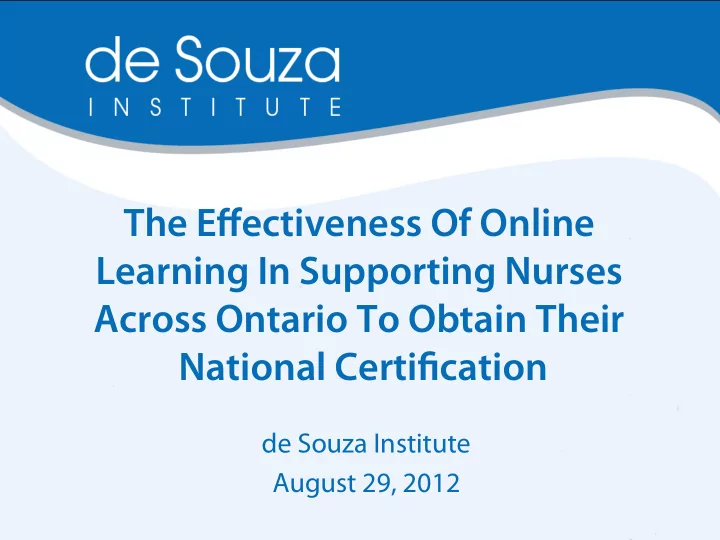

The E ff ectiveness Of Online Learning In Supporting Nurses Across Ontario To Obtain Their National Certi fi cation de Souza Institute August 29, 2012
Content development • Laura Rashleigh led all four years of content development AND • Charissa Cordon co-lead 2009 group • 27 experts across the province for initial weekly content development • 12 experts for mock exam development • de Souza evaluation, IT, instructional design and administration support
Course Syllabus Included: • Studying strategies & • Knowledge about and care exam writing strategies of the patient with: • Chemo & biotherapy • Lung cancer • Radiation & surgical • Breast cancer nursing care • Colorectal and gastric • Stem cell transplant • Malignant Hematology • Complementary therapies • Melanoma • Oncologic emergencies • GU, prostate and • Symptom management gynecological cancers and support • Head and neck • Palliative care • Sarcoma • Psychosocial support, • Pediatric oncology care spiritual support & • Rehabilitation and sexuality survivorship
Teaching and Learning Theories Underpinning the Study Group across 2009-2012 • Adult Learning Theory • Generational Learning • Cooperative Learning • CNA Oncology Nursing Competence (2008) and CANO Standards (2006) • Learner-centred Approach
A comparison of 3 teaching methods* Mode of delivery Advantages Success Rate 2009 • Every Tue night at local • Peer support –Weekly live • 94% (100 nurses) centres (via video interaction via conf) videoconference • Archived webcast • Collaborative groups and +Blog case studies 2010 • eLearning with slides • Available 24/7 • 88% (110 nurses) and voice over • Asynchronous (captivate) • 30 min -1 hr slides online • Discussion forum • Case studies for groups • Virtual groups • Monthly videoconf 2011 • eLearning +VL**+ • Self-paced, active • 95% in 2011(102 & Interactive activities learning nurses) 2012 • Self-directed local • 20-40 m/wk application: • 90% in 2012 group wherever Interactive activity, quiz (reporting possible • 3 hour/wk pre reading+ ongoing) • Enrichment reading VL+ facilitator notes • Unit spec collab forum
Study Group Symposium • 1 Day study symposium • Problem Based Learning Curriculum based on: • Knowledge gaps • Confidence levels • Multiple choice answering strategies • Mock Exam • CNA exam template • Supported expenses
Demographics: Age and Experience
Distribution of learners across the province
Assessment on e ff ectiveness: symposium day mock exam score (2009-11) • Mock Exam Score comparable from 2009-2012 – see below • CNA success rate: 94% in 2009, 88% in 2010, 95% in 2011, 90% in 2012 (2012 reporting ongoing) 100 80 60 40 20 0 Mock ¡Exam 2009 2010 2011 2012
Assessment on e ff ectiveness: Change in perceived con fi dence (2009-2012) • CNA competency areas all improved From prevention, diagnosis & staging, treatment Modalities, symptom Management to supportive and continuous care • Two examples are presented – confidence ↑ in all four years 4 3.5 3 2.5 2 1.5 1 0.5 0 oncology ¡EM chemotherapy ¡with ¡stem ¡cell ¡rescue 2009 ¡pre 2009 ¡post 2010 ¡pre 2010 ¡post 2011 ¡pre 2011 ¡post 2012 ¡pre 2012 ¡post
Is online learning e ff ective? Meta-Analysis of all online learning publications from 1996-2008 (US Dept of Educ 2010) • students in online learning performed modestly better than face-to-face instruction • Difference was larger between blended model vs taught entirely face-to-face • Effect sizes were larger when online instruction was collaborative or instructor- directed vs when learners worked independently • The effectiveness was broad across different content and learner types
Conclusion • The study group was a useful approach to assist nurses in passing the CNA exam • Videoconference worked well in year one but self limiting in terms of potential – i.e, access to OTN, and expansion of the program to national/international users • eLearning helps to overcome geographical distances and accessibility issues • eLearning plus in person one day symposium is effective • Collaborative and cooperative community approach can be maintained online and locally
www.desouzanurse.ca Thank-you
Recommend
More recommend